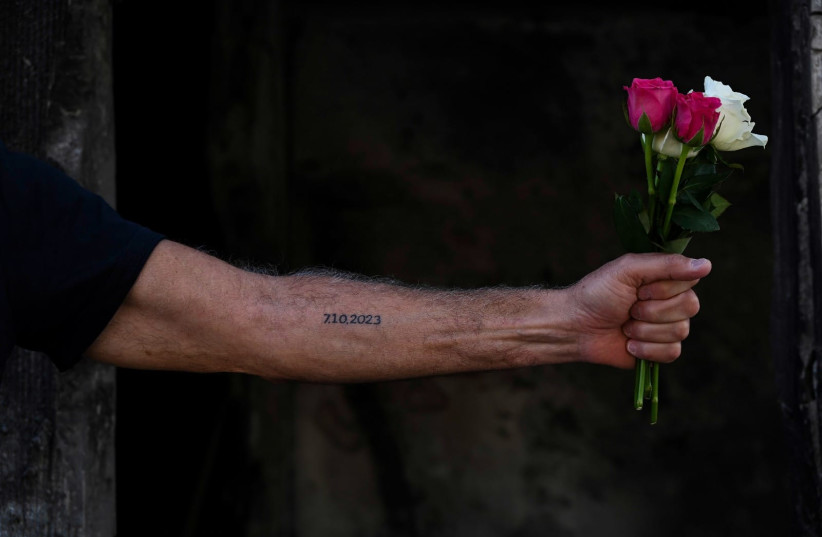Haim Jelin is the former head of the Eshkol Regional Council and member of Knesset on behalf of Yesh Atid. Born in Buenos Aires, he immigrated to Israel at the age of 18 with the Etgar group and served as a lone soldier.
A resident of Kibbutz Be’eri, Jelin is a prominent voice in expressing the pain that has surrounded him since the Hamas massacre. To commemorate the horror that took place on October 7, he immortalized Black Sabbath by tattooing the date on his arm.
Where did the war find you?
I had come in from Australia on Wednesday. I hadn't seen my son and daughter-in-law for three months. When I arrived in Be’eri, we said we would have dinner together on Friday night. They came and, of course, slept over. At 6:31 on Saturday morning, we heard the rockets like an explosion. I went outside and realized that when on a Saturday a missile was going toward Tel Aviv, it meant war. The question was what kind of war. Fifteen minutes later, I started hearing gunshots and realized that this was much more complex. I told the children and everyone to go into the safe room with the dogs. Five minutes later, we received a message that there were terrorists in the kibbutz; 250 terrorists occupied Be’eri and were killing people.
What led you to volunteer?
We were enclosed in total darkness in the safe room, so it was quite unpleasant to be there. The soldiers told us to leave, but went back in because the terrorists threw grenades at us and blew up the windows. Miraculously, we were not hurt.
Something happened to me. I suddenly ‘saw the light’ and was very calm. I also calmed down the soldiers. Something inside of me lit up when I left the place alive. The light I saw made me aware that I had to start walking a path that even I didn't know what it was or how. I just knew I had to help in whatever way I could.

I received a phone call from one of the generals who told me that I needed to help the IDF’s New Horizon program to help restore the Gaza border communities. I volunteered and taught them what a community is. They consulted me on how to maintain the community and what to do – everything I knew as the head of an authority. When things started to work out with agriculture and factories and we did everything we could, I transferred it to Moshe Edri from Tekuma, who is responsible for the reconstruction of Gaza after the Swords of Iron war is over.
I don't know how to explain it, but there is a path and I follow it. I don't know where it will take me, but I follow it. I am not in politics nor under no circumstances in places that are not me because politics destroys everyone, so something else is needed. The other something is to change the language and consciousness and try to follow this path. That's why so many people get power from my ideas. We paid a very high price. If we manage to fix and do something else, then here we are.
It was something so shocking, Everything we dreamed about crashed. It brings a different consciousness in people besides socioeconomics. The shock is like an ache in the heart of each of us. You have to take the sabra that we are. You have to peel off the shell and leave the insides. The Land of Israel is my goal, and I am not afraid of anything. This is also part of what happened that day.
I don't need a salary or a title. I feel that I should be a son of Adam who gives his all to the State of Israel
What did you tattoo on your arm?
On the fifth day of the war, I got a tattoo. I already had a tattoo of an open circle. A circle is perfect with a beginning and an end that is always in the same place. Nothing comes close to perfection, and part of our consciousness is that we are perfect. I went to the same tattoo artist and told him to tattoo the private holocaust day that belongs to everyone, that humiliates everyone in the State of Israel.
Who are your war heroes?
Those civilians who arrived who were not conscripts who took up arms and fought to save us and sacrificed their lives. Reservists, single people, who came to Be’eri and fought shoulder to shoulder against a standby squad, the company of a standby squad who were volunteers, my friends. I lost two young men there for whom I was a bar mitzvah guide: Eric Kraunik, commander of the standby squad; and Gil Boim, who was my apprentice.
Will Be’eri ever be the same again?
Be’eri will never return to what it was. It will be something else. At first it may be a smaller community, but it will grow to be bigger and greener. Neither Kfar Gaza nor Nahal Oz nor any settlement will ever be the same. Nor will the State of Israel be the same. There is some internal process here that this thing is shocking, like an internal earthquake, and something opens up in people. They want something different. They are no longer satisfied with what was. They are not satisfied with the same politics and meanings that govern us. We must believe and make it better. Everyone can change. What happened is a kind of earthquake, and we need to make sure that it goes to a positive place and not be hostile with the Left and the Right. We must stop the political extremism.
This article was written in cooperation with Haim Jelin
